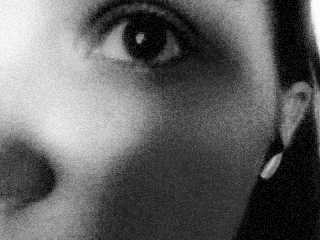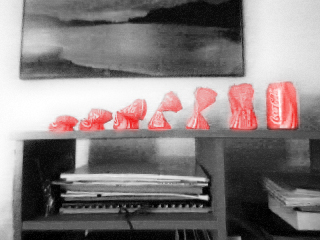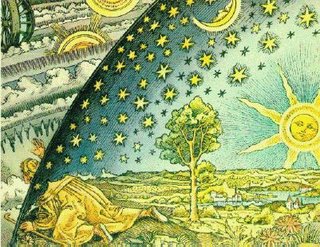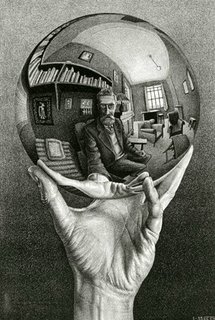No wonder why Gilles Apap is sometimes dubbed the French Kennedy...
December 27, 2006
December 26, 2006
Violinic charisma
 Well, I had only ever heard about the guy. Now I have seen one of his concerts on dvd, and I am absolutely dazzled. Nigel Kennedy rocks.
Well, I had only ever heard about the guy. Now I have seen one of his concerts on dvd, and I am absolutely dazzled. Nigel Kennedy rocks. And if Nigel Kennedy is old news to you, try Gilles Apap.
Kennedy is more influenced by Hendrix or The Doors, and Apap is apparently more into a bohemian, Indian sort of music (even when they are playing classical music). But when you look at them playing, you have the same impression that they become one with their violin.
It is completely addictive. Kennedy is more influenced by Hendrix or The Doors, and Apap is apparently more into a bohemian, Indian sort of music (even when they are playing classical music). But when you look at them playing, you have the same impression that they become one with their violin.
December 24, 2006
December 20, 2006
Something is new in the state of Denmark
Beware! This post is going to be extremely self-centered. Feel free to skip it.
 I have been mentally comparing this academic year with the last one. The thing is, since I failed the agrégation last year (I even hate saying it), I am doing it all over again, going to the (mostly) same classes, living in the same place, and so on. So nothing has changed much, really. And still, everything is different... Exam-wise I am more stressed out because it's the second attempt and there is more pressure, but I know what to expect, which helps a lot. Many of the students preparing for the exams are new, and some teachers were replaced by others. It's a blend of new and old faces inside the same picture.
I have been mentally comparing this academic year with the last one. The thing is, since I failed the agrégation last year (I even hate saying it), I am doing it all over again, going to the (mostly) same classes, living in the same place, and so on. So nothing has changed much, really. And still, everything is different... Exam-wise I am more stressed out because it's the second attempt and there is more pressure, but I know what to expect, which helps a lot. Many of the students preparing for the exams are new, and some teachers were replaced by others. It's a blend of new and old faces inside the same picture.There are a couple of persons I already knew, but whom I am getting to know better. I realize I have quite a hard time making friends. It takes me forever to trust someone enough to really bond with them. Or rather, only a very small number of persons can make me feel safe enough to go there. Last year it didn't happen once, and I felt very lonely. So I am amazed at how everything is/feels different now. I hope the persons I am getting to know better now will become real friends.
Only time can tell!
Here are my Christmas presents from Frank. He took them in Beijing:


December 16, 2006
"you didn't know???"
 Lately I've listened to a mind-spinningly wide variety of music genres, and I love every one of them. There are a couple of genres I definitely don't like (and don't believe I will anytime soon), but I feel like my tastes could stretch endlessly.... It might be because I have so little choice in my life right now, about what to do or think, that it's a way for me to compensate for my frustration -- sailing on the vast ocean seas of musical exploration.
Lately I've listened to a mind-spinningly wide variety of music genres, and I love every one of them. There are a couple of genres I definitely don't like (and don't believe I will anytime soon), but I feel like my tastes could stretch endlessly.... It might be because I have so little choice in my life right now, about what to do or think, that it's a way for me to compensate for my frustration -- sailing on the vast ocean seas of musical exploration.I have only recently discovered the band "Godspeed You! Black Emperor", which apparently is Canadian. It is some sort of ambient post-rock, with sounds that sometimes remind me of Pink Floyd, and sometimes of Archive, among others. The tracks are very long (often over 15 minutes) and create an enthralling atmosphere.
When I ask my friends if they know Godspeed, I'm sure they'll look at me like I'm nuts and say "you didn't???" -- which is usually what happens when I think I've discovered something. Imagine how Columbus or Vespucci would have felt if they had come back to Europe and everyone had said "what, you mean you didn't know???"
-- at least Don Cristobal wouldn't look so offended for nothing...

When I ask my friends if they know Godspeed, I'm sure they'll look at me like I'm nuts and say "you didn't???" -- which is usually what happens when I think I've discovered something. Imagine how Columbus or Vespucci would have felt if they had come back to Europe and everyone had said "what, you mean you didn't know???"
-- at least Don Cristobal wouldn't look so offended for nothing...

December 15, 2006
Morphée m'aime
My bedtime music tonight:
Archive - You all look the same to me - Again
Jeff Buckley - Live at Sin-é - Hallelujah & Lover, you should have come over
The Tindersticks - Waiting for the moon - Until the Morning Comes
Jesse Sykes & The Sweet Hereafter - Reckless Burning - Reckless Burning
Robert Plant & The Strange Sensation - Mighty Rearranger - All the Kings Horses
Archive - You all look the same to me - Again
Jeff Buckley - Live at Sin-é - Hallelujah & Lover, you should have come over
The Tindersticks - Waiting for the moon - Until the Morning Comes
Jesse Sykes & The Sweet Hereafter - Reckless Burning - Reckless Burning
Robert Plant & The Strange Sensation - Mighty Rearranger - All the Kings Horses
| Oh, Morpheus, give me joy till morning For my forever painful love: Just blow out candles' burning And let my dreams in blessing move. Let from my soul disappear The separation's sharp rebuke! And let me see that dear look, And let me hear voice that dear. And when will vanish dark of night And you will free my eyes at leaving, Oh, if my heart would have a right To lose its love till dark of evening! Alexander Sergeyevich Pushkin (1799-1837) |
My name is -
 Yesterday night we had a great conference about Casino Royale -- both the 1953 novel and the 2006 film -- and about how the representation of Britishness has changed. A lot of paratextual elements too, that is to say how the novel and the films were promoted, in what particular way they were received and so on. Then my friend and I went to the restaurant with two teachers and the guest, and had a great time talking about films and research and teaching. There is a wide range of possibilities within the field of cultural studies that I can't wait to explore... the world is not enough!
Yesterday night we had a great conference about Casino Royale -- both the 1953 novel and the 2006 film -- and about how the representation of Britishness has changed. A lot of paratextual elements too, that is to say how the novel and the films were promoted, in what particular way they were received and so on. Then my friend and I went to the restaurant with two teachers and the guest, and had a great time talking about films and research and teaching. There is a wide range of possibilities within the field of cultural studies that I can't wait to explore... the world is not enough!December 8, 2006
Please don't talk to me
Mr Bennet to Elizabeth in Pride and Prejudice:
"You are not going to be missish, I hope, and pretend to be affronted at an idle report. For what do we live, but to make sport for our neighbours, and laugh at them in our turn?"
"You are not going to be missish, I hope, and pretend to be affronted at an idle report. For what do we live, but to make sport for our neighbours, and laugh at them in our turn?"
 weapons of mass antisocial behaviors
weapons of mass antisocial behaviorsI am presently being bothered by the she-homo-laptopian seated at my left.
I was quietly reading about Determinism in History on the internet and listening to Mozart (the very relaxing clarinet concerto) when this student arrived. All of a sudden all I could hear was the combination of her frantic typing and of the erratic rhythm of her open-mouthed chewing. The typing isn't so bad, but the chewing is so high-pitched that I had to switch from Mozart to swing, and considerably raise the volume of my headphones.
"Universal -chew- determin-chew-ism depends on a -chew-concept of cau-chew-sation that was -chew- not -chew chew-generally adopted -chew-until after the seven-chew-teenth-century-chew- “scientific rev-chew chew-olution.”"
I thought maybe she has to finish some paper and is stressed out about it. But no, she is actually chatting on the internet. I know it's bad to look at what others are doing, but she was the one invading my personal space in the first place.
So now I'm posting this misanthropic message while listening to a rather loud Sinatra. (And as I'm typing this, another student is taking place at my right, with a huge book entitled Molière. Now this one I like!)
I know, I'm proud and prejudiced...
I was quietly reading about Determinism in History on the internet and listening to Mozart (the very relaxing clarinet concerto) when this student arrived. All of a sudden all I could hear was the combination of her frantic typing and of the erratic rhythm of her open-mouthed chewing. The typing isn't so bad, but the chewing is so high-pitched that I had to switch from Mozart to swing, and considerably raise the volume of my headphones.
"Universal -chew- determin-chew-ism depends on a -chew-concept of cau-chew-sation that was -chew- not -chew chew-generally adopted -chew-until after the seven-chew-teenth-century-chew- “scientific rev-chew chew-olution.”"
I thought maybe she has to finish some paper and is stressed out about it. But no, she is actually chatting on the internet. I know it's bad to look at what others are doing, but she was the one invading my personal space in the first place.
So now I'm posting this misanthropic message while listening to a rather loud Sinatra. (And as I'm typing this, another student is taking place at my right, with a huge book entitled Molière. Now this one I like!)
I know, I'm proud and prejudiced...
December 6, 2006
Why won't you talk to me

My internet connection at home is broken right now...
It's very weird to be sitting in a corner in a hallway of building J on campus, surrounded by fellow homo laptopians. Apparently we're all here to benefit from the joys of world wide communication, all plugged to the wall for power and connected to the wireless network, and all very carefully avoiding eye-contact with one another. That's what I don't like about university: it should be a place of absolute open-mindedness and exchanges, and instead in seven years I've found it more difficult to make friends here than anywhere else in the city.
December 4, 2006
I have stood here before...
When I have to walk in the pouring rain, I love the moment when I'm so completely soaked that I don't even care anymore. I'm standing in the street with my hands in my pockets, and I let the water run down my face as if I were in my shower. People run around with their collars up, holding things over their heads, trying to hide from the rain, and I'm there, wholly relaxed, waiting for the traffic to stop. It feels like time has slowed down for me only. I get the exact same feeling when I look at this picture...

December 2, 2006
November 30, 2006
You name it

"Mr Evil Devil?"
"why do you insist on calling me that? you know I hate it"
"because I like it, and you never tell me why you hate it"
"obviously because the way you say it I sound like a caricature. I mean "evil devil", it's like all I do is being evil"
"maybe it would explain the name"
"which I didn't choose either, by the way"
"who does? and anyway what would you name yourself?"
"well if you must know, I like Yaveh...."
"you're joking"
"no! why do you think I got kicked out of up there??"
"I don't think it was only a matter of name!"
"name, my dear, is everything. You think stories are everything, but you're wrong. Stories are only an elaborate way of using names. You will argue that each name is a small story, but that's only word play."
"So really it doesn't matter whether I call you Mr Evil Devil or Simon. You just don't like my calling you"
"if you were as afraid of me as you should, you wouldn't even dare call me at all."
"but I'm not afraid!"
"Thank you, I noticed."
"why do you insist on calling me that? you know I hate it"
"because I like it, and you never tell me why you hate it"
"obviously because the way you say it I sound like a caricature. I mean "evil devil", it's like all I do is being evil"
"maybe it would explain the name"
"which I didn't choose either, by the way"
"who does? and anyway what would you name yourself?"
"well if you must know, I like Yaveh...."
"you're joking"
"no! why do you think I got kicked out of up there??"
"I don't think it was only a matter of name!"
"name, my dear, is everything. You think stories are everything, but you're wrong. Stories are only an elaborate way of using names. You will argue that each name is a small story, but that's only word play."
"So really it doesn't matter whether I call you Mr Evil Devil or Simon. You just don't like my calling you"
"if you were as afraid of me as you should, you wouldn't even dare call me at all."
"but I'm not afraid!"
"Thank you, I noticed."
November 29, 2006
Full of the Devil
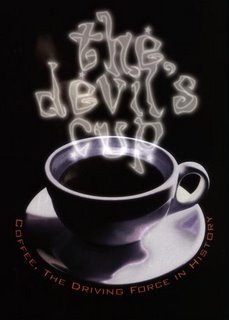 Anyone with extra time, you name the price, I'll buy it. I would sell a bit of my soul to the Devil, but he says it's not good enough.
Anyone with extra time, you name the price, I'll buy it. I would sell a bit of my soul to the Devil, but he says it's not good enough. He said: "I want pure souls that don't ask questions"
So I told him, "pure doesn't exist, and no questions means either over-confident or downright stupid"
"I mean I want souls that don't argue"
"You contradict yourself"
"No I don't"
"Yes you do. You know well the base arg- in argue means 'to be white, bright, clear', and someone who argues is someone who is willing to be crystal clear. So that's the kind of souls you're supposed to be looking for. Otherwise you wouldn't be Lucifer, the light carrier. More coffee?"
"Yes please. You see that's why I like spending an hour or two with you now and then"
"Because I argue well?"
"No, because you make good coffee."
So I told him, "pure doesn't exist, and no questions means either over-confident or downright stupid"
"I mean I want souls that don't argue"
"You contradict yourself"
"No I don't"
"Yes you do. You know well the base arg- in argue means 'to be white, bright, clear', and someone who argues is someone who is willing to be crystal clear. So that's the kind of souls you're supposed to be looking for. Otherwise you wouldn't be Lucifer, the light carrier. More coffee?"
"Yes please. You see that's why I like spending an hour or two with you now and then"
"Because I argue well?"
"No, because you make good coffee."
November 22, 2006
Jazz me up
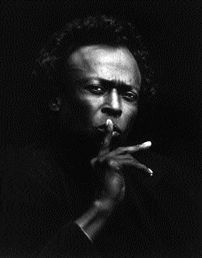 I'm going through a jazz week. I heard a bit of Miles Davis in some movie, and BAM! it hit me. The urge to dig up and dust Miles, John, Cannonball and co.... and they're working their magic:
I'm going through a jazz week. I heard a bit of Miles Davis in some movie, and BAM! it hit me. The urge to dig up and dust Miles, John, Cannonball and co.... and they're working their magic:Right now I have a lot of work to do that stresses me out, my shower is being renovated, the entire appartment next door is being renovated (that's a lot of people regularly hammering at walls, believe me), and the skies are shades of sad grey.
Yet "Blue in Green" is playing softly, making this not only a perfect moment, but a moment I'll be able to conjure up anytime in the future by just playing this track. Music has a way of making past feelings materialize like a photograph.
And now I see the sun decides "Autumn Leaves" is a right time to peak through. Perfect, I tell you.
November 20, 2006
November 19, 2006
My devolution theory
From left to right:
Can no.1 comes from the Cocaniferous geological era.
Then it's the Cocapermian era, the Triassicola era, the Jurassicola era, the Cretacolaceous era, the Caffeinotiertiary era, and finally the Erectocan quaternary era. Always Coca-Cola.
"Go back to work!" I hear you silently say. And so I do.
November 18, 2006
Mon luth constellé
 I love living on the fourth floor. Nancy is a small city, so downtown buildings are not very tall. I have these big windows and quite a wide view of the city -- roofs of old downtown houses, a couple of buidlings, the trees of the Pépinière park, the basilique St Epvre, the tall Park Inn railway station hotel, the stadium spotlights. These are on, so I know there's a football/soccer match tonight. The lights inside the bell tower of the basilique are still on so I know it's not past midnight.
I love living on the fourth floor. Nancy is a small city, so downtown buildings are not very tall. I have these big windows and quite a wide view of the city -- roofs of old downtown houses, a couple of buidlings, the trees of the Pépinière park, the basilique St Epvre, the tall Park Inn railway station hotel, the stadium spotlights. These are on, so I know there's a football/soccer match tonight. The lights inside the bell tower of the basilique are still on so I know it's not past midnight.The one thing I hate about living in a city is the sky at night. It's either shades of orange because of the reflection of city lights on clouds, or plain black. The only heavenly bodies you can see are the moon and some of the brightest stars. And a couple of planets, like Venus or Jupiter.
If you haven't already, you must download Stellarium. It's a great (and easy to use and free) planetarium. And very beautiful.
I remember our philosophy teacher in high school telling us about stars. See, latin sidus means "heavenly body, star, constellation", and desiderare (de-siderare) basically means "to stop seeing the star". So, desiring originally means you realize something important (the star) is missing. And he told us how desire is what keeps you alive and moving, that if you have no "star" to look for, you become still, and depressed. And that's a disaster, "a bad star". Consider means "seeing all the stars", which I think was a navigation term, initally. When you see all the stars, you can make the right decision, you know where to go.
November 16, 2006
I'm a Charlotte
I finally saw Lost In Translation. I loved it. I knew I would.
Talking about translation, I have this beautiful text to translate into French: it's from Stephen Crane's "Open Boat". Here's one sentence: "The mind of the master of a vessel is rooted deep in the timbers of her, though he commanded for a day or a decade, and this captain had on him the stern impression of a scene in the greys of dawn of seven turned faces, and later a stump of a top-mast with a white ball on it that slashed to and fro at the waves, went low and lower, and down."
To think I'm about to make a French mess of it!

Talking about translation, I have this beautiful text to translate into French: it's from Stephen Crane's "Open Boat". Here's one sentence: "The mind of the master of a vessel is rooted deep in the timbers of her, though he commanded for a day or a decade, and this captain had on him the stern impression of a scene in the greys of dawn of seven turned faces, and later a stump of a top-mast with a white ball on it that slashed to and fro at the waves, went low and lower, and down."
To think I'm about to make a French mess of it!

November 15, 2006
The lovely treachery of sounds
 Matt got me thinking (this is becoming a forum, really) about how I learned English. And it's actually all about imitating.
Matt got me thinking (this is becoming a forum, really) about how I learned English. And it's actually all about imitating.The earliest memory I have of English is in my parents's car, looking outside, and listening to 50's and 60's American hits, especially Tutti Frutti, which I thought I sang perfectly well. But since I was six years old, and had no idea what anything meant, it sounded more like "tooda frood, all rooda...". In France we call that "yogurt English". My parents later told me it made them laugh, when I was really doing my best to imitate Little Richard.
When I was nine, I started going to a weekly private English lesson, at my best friend's house. His mother is a great English teacher, and she taught us the basics of English with a "Chatterbox Student Book." It was fun time every tuesday night, for two years.
Since I could read basic English, instead of just singing songs in "yogurt", I learned lyrics by heart, and would listen to a song on my parents' record player again and again until I could sing it perfectly. The first one I learned was Chris Rea's Auberge. I tortured myself until I could pronounce the "th" and "h" sounds and sing it all both fast and articulately. I didn't understand half of the lyrics, and to this day I don't know why I felt the urge to do that.
But I kept doing that with all the songs I liked, and later on, as my English got better, and it was easier to find films in English, I started doing it with films. I imitated accents and intonations.
When I got in college, I lived in a students hall, and I only had a compact stereo, so back home I recorded my favorite films on audio tapes, so I could listen to films in English all the time. I still do that.
I know I'm particularly addicted to English, but the urge to imitate languages goes beyond that. I learned some of the Lakota parts in Dances With Wolves, and I can't help imitating all sorts of French accents. At school I was very bad at German, except for the accent, so my teacher was always puzzled. So in a way I always feel like I'm only convincing people I speak good Engli
 sh by imitating it. In Paris Frank (Tester) told me "your English is flawless", and I felt like a sort of charlatan. I wanted to answer "it is only a reproduction!"
sh by imitating it. In Paris Frank (Tester) told me "your English is flawless", and I felt like a sort of charlatan. I wanted to answer "it is only a reproduction!"It's a kind of Magrittean approach to languages, I guess.
November 14, 2006
Happy me
 Today was sort of an empty day. I got up this morning with no sense of purpose, and no matter what I did, it seems I went through this day with no motivation whatsoever for anything at all. I have tons of things to do, and I was busy all day, but I felt like a robot. It got to the point when there was no music I felt like listening to, although I have an astronomic amount of albums, of every music genre you can think of.
Today was sort of an empty day. I got up this morning with no sense of purpose, and no matter what I did, it seems I went through this day with no motivation whatsoever for anything at all. I have tons of things to do, and I was busy all day, but I felt like a robot. It got to the point when there was no music I felt like listening to, although I have an astronomic amount of albums, of every music genre you can think of.I think the weather had something to do with it: it was positively gloomy. As a great uncle of mine used to say:"we would fare better with no weather at all!" or something like that. I can't translate it literally, it would make no sense.
Usually when I feel under-motivated, I can summon the right thought and feel better in an instant. It works with the cold, too: when I'm cold I make the decision that I'm going to relax and that I'm not going to let it bother me. Actually I do that all the time, whenever I feel that something is starting to bug me -- anything or anyone --, I rationalize and consciously switch to a different point of view. And it works 99 percent of the time! That's my way of being a happy person. The downside of it is: I can't understand people who complain on and on and about everything. I tend to associate it with a lack of will power, which is probably unfair of me.
Usually when I feel under-motivated, I can summon the right thought and feel better in an instant. It works with the cold, too: when I'm cold I make the decision that I'm going to relax and that I'm not going to let it bother me. Actually I do that all the time, whenever I feel that something is starting to bug me -- anything or anyone --, I rationalize and consciously switch to a different point of view. And it works 99 percent of the time! That's my way of being a happy person. The downside of it is: I can't understand people who complain on and on and about everything. I tend to associate it with a lack of will power, which is probably unfair of me.

Anyway today I was not unhappy -- thank God -- I was just frankly too lazy to switch to another, better point of view.
But it's all over now: I have found the right thought, the right point of view, the right music, and the right book to read. And it will be an in bed way of reading for me.
Happy me!
But it's all over now: I have found the right thought, the right point of view, the right music, and the right book to read. And it will be an in bed way of reading for me.
Happy me!
November 13, 2006
-Girl With a Pearl Earring-

This is her picture as she was:
It seems a thing to wonder on,
As though mine image in the glass
Should tarry when myself am gone.
I gaze until she seems to stir,--
Until mine eyes almost aver
That now, even now, the sweet lips part
To breathe the words of the sweet heart:--
And yet the earth is over her.
from The Portrait,
by Dante Gabriel Rossetti (1828-1882)
My first frontier
 I remember as a kid being utterly fascinated by the idea of a foreign country. I remember "hiking" in the Pyrenees with my parents when I was six or seven, and one day we were in the Cirque de Troumouse (cf. map); my mother was pointing at elements of the cirque and naming them, and then she told me "...and this whole line of mountains is the frontier. Right behind this is Spain." I wouldn't believe her: surely that was not the real frontier, Spain could only be much further away! It was irrational, but to me, a foreign country was so remote psychologically that it was physically impossible to stand so close to one.
I remember as a kid being utterly fascinated by the idea of a foreign country. I remember "hiking" in the Pyrenees with my parents when I was six or seven, and one day we were in the Cirque de Troumouse (cf. map); my mother was pointing at elements of the cirque and naming them, and then she told me "...and this whole line of mountains is the frontier. Right behind this is Spain." I wouldn't believe her: surely that was not the real frontier, Spain could only be much further away! It was irrational, but to me, a foreign country was so remote psychologically that it was physically impossible to stand so close to one.It was my first frontier. I tried to imagine what it was like beyond, people living in the same mountains, but speaking a different language. If they were so close, why couldn't they speak French, the real language?
November 9, 2006
When I walk in a church
 (Laon et sa cathédrale, Aisne, France)
(Laon et sa cathédrale, Aisne, France)Photo de Jean-Pierre Gilson
I have been thinking quite a lot about God lately, probably because of The Power and the Glory, which is a sort of long meditation about faith shaped into a thriller. A "whisky priest" running away from the police in Mexico when the clergy was persecuted.
Anyway yesterday night I had a conversation about faith and God with a friend of mine who is a firm believer. I told her I'm really not sure I believe in God, but that I think about God a lot, and she said "if you think about Him then you believe in Him." She looked and sounded so positive, like it was completely obvious, that for the first time in years I really don't know what to think. All this time when I thought I had lost my faith, did I really only have a different faith of my own? It is always so difficult to distinguish culture from the cult, and the cult from the individual faith... that deep feeling when I walk in a church and light a candle: is that faith, then?
Then, as the conversation went on I realized we have a rather comparable feeling of what the faith in God implies/should imply. There was a moment when we deviated, because she clearly defines God as a person, and I don't -- I have a more abstract vision, I guess. But we both agreed that it is an absolute that can only transcend human understanding, and that at the same time God is the essence of humanity, with all its flaws and weaknesses.
I still don't know... but God has to be the most beautiful story ever written -- whether that proves His existence or not.
 (St Quentin, Aisne, France)
(St Quentin, Aisne, France)
Photo de Jean-Pierre Gilson
Anyway yesterday night I had a conversation about faith and God with a friend of mine who is a firm believer. I told her I'm really not sure I believe in God, but that I think about God a lot, and she said "if you think about Him then you believe in Him." She looked and sounded so positive, like it was completely obvious, that for the first time in years I really don't know what to think. All this time when I thought I had lost my faith, did I really only have a different faith of my own? It is always so difficult to distinguish culture from the cult, and the cult from the individual faith... that deep feeling when I walk in a church and light a candle: is that faith, then?
Then, as the conversation went on I realized we have a rather comparable feeling of what the faith in God implies/should imply. There was a moment when we deviated, because she clearly defines God as a person, and I don't -- I have a more abstract vision, I guess. But we both agreed that it is an absolute that can only transcend human understanding, and that at the same time God is the essence of humanity, with all its flaws and weaknesses.
I still don't know... but God has to be the most beautiful story ever written -- whether that proves His existence or not.
 (St Quentin, Aisne, France)
(St Quentin, Aisne, France)Photo de Jean-Pierre Gilson
November 7, 2006
Use soap, and write stories
 The question on everyone's lips when I tell them I study culture, art, stories and language: what for? who could it help? you can't cure someone with a story!
The question on everyone's lips when I tell them I study culture, art, stories and language: what for? who could it help? you can't cure someone with a story!Yes you can!
Why is it so hard to remember that words can kill, wreak havoc, and bring salvation? All the stories we hear, read, see, imagine, shape both our perception of the world and our sense of self. People have used stories to undertake crusades. Forget about their power, and tyrants won't even have to burn books anymore. Remove stories from humankind, and the one thing left to distinguish us from other animals will be soap.
So, funny how this world, which is made of stories, so easily dismisses them as trivial entertainement -- the inconsequential thing we supposedly produce to forget about the real world, for a while only.
November 6, 2006
Brain storm
Devolution in the UK: a historical inevitability? -- The profane and the sacred in The Power and the Glory -- Language in Coriolanus -- Characterization in Pride and Prejudice -- Cleft sentences in English -- The Great Vowel Shift -- Translating Maupassant and Stephen Crane -- The place of Lewis and Clark in American history -- and on and on and on!
Whoever decided there was only 24 hours in a day and 365 days in a year was not preparing for this exam.
Whoever decided there was only 24 hours in a day and 365 days in a year was not preparing for this exam.
November 4, 2006
O lilliterate loiterer!
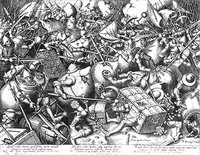 While I was very seriously working on the specific aspect of language in Coriolanus, for some strange and unfathomable reason that has nothing to do with a lack of assiduity, I came across the extremely funny Shakespearean Insulter on the internet. I also recommend the Shakespeare Insult Kit. If you're going to insult someone, at least make it original. And never underestimate the element of surprise.
While I was very seriously working on the specific aspect of language in Coriolanus, for some strange and unfathomable reason that has nothing to do with a lack of assiduity, I came across the extremely funny Shakespearean Insulter on the internet. I also recommend the Shakespeare Insult Kit. If you're going to insult someone, at least make it original. And never underestimate the element of surprise.November 3, 2006
Loki Sky Walker
 This is one of his names. But he is far more ancient and powerful than Luke. At least he used to be, before Christianization and Hollywood.
This is one of his names. But he is far more ancient and powerful than Luke. At least he used to be, before Christianization and Hollywood.He is the Norse god of mischief, a master trickster, changing shapes and genders at will. Father and mother of many beasts, humans and monsters. He is the adopted brother of the great Odin, god of war and wisdom. He is a creator of chaos. A giant that hides in the smallest things.
Loki is the Sly-One, the Sly-God, the Shape-Changer, the Trickster, the Sky Traveller, the Sky Walker, the Lie-Smith and Loftur.
Loki can trick gods.
What say you to that, young padawan?
November 2, 2006
Anekdotos II
 I'll start by saying that I have in my possession these two big, hardcover books called "La civilisation du phoque." They are, basically, a compiling of the journals Paul-Emile Victor kept when he stayed in Ammassalik, Greenland in the thirties. PEV, as he is often called, is a major reference in terms of exploration of the poles and of inuit ethnography. Now these two books he wrote with the help of Joëlle Robert-Lamblin, a great researcher who works on indigenous peoples of the Arctic.
I'll start by saying that I have in my possession these two big, hardcover books called "La civilisation du phoque." They are, basically, a compiling of the journals Paul-Emile Victor kept when he stayed in Ammassalik, Greenland in the thirties. PEV, as he is often called, is a major reference in terms of exploration of the poles and of inuit ethnography. Now these two books he wrote with the help of Joëlle Robert-Lamblin, a great researcher who works on indigenous peoples of the Arctic.I remember, when they told us our papers had been accepted, I told Chloé, "maybe even Joëlle Robert-Lamblin will come to the conference!" But then they sent us the list of participants, and she was not in it.
On thursday I was seated at the table in the projection room, waiting for the session to begin. Suddenly I looked up from my paper and saw Joëlle Robert-Lamblin looking for a seat. Slow-motion, close-up and dismay all over again (Anekdotos I). On my left sat Yvon Csonka and on my right Nancy Wachowich, both experts in social anthropology. Saying that at that moment I wanted to disappear would be quite an understatement. Since I could not very well run away or crawl under the table, I tried to focus on my paper.
At the end of the session, to my great relief, Nancy told me she thought my paper was interesting. And Mrs Robert-Lamblin came up to me, and told me the greatest anecdote about a very old film I talked about. She met the son of the main actor in the film, and promised to send me his email address (which she did) and I gave her a copy of the film. I couldn't believe it. It took me at least ten minutes to recollect myself.
November 1, 2006
Anekdotos I
 So, at the embassy, Chloé and I recognized Christopher Trott, whom we had met in Rouen over a year ago. Fortunately he remembered us (we'd already had a great time in Rouen), and kindly introduced us to his friends Peter Kulchyski from the University of Manitoba as well, and Frank Tester from UBC.
So, at the embassy, Chloé and I recognized Christopher Trott, whom we had met in Rouen over a year ago. Fortunately he remembered us (we'd already had a great time in Rouen), and kindly introduced us to his friends Peter Kulchyski from the University of Manitoba as well, and Frank Tester from UBC.We also met David Neufeld from Whitehorse. What happened is that Chloé saw "Northwest Territories" I think on his nametag, and started stealing glances at him and speaking in hushed, eager tones with me -- yes, just because of where he comes from (sorry Chloé!). I turned around and saw that he was smiling at us with an inquisitive look on his face. So, although I am dreadfully shy in this kind of situation, I went to him to explain the reason of our enthusiasm. He was very friendly and chatted with us for quite a while.
That night I also got to see two of the organizers, Béatrice Collignon and Michèle Therrien, whom I already knew, and they told me "oh, so, is your paper really in French? because it would be much better if it was in English, you know." Slow motion, close-up on my face, on which you could read total dismay. "I wrote it in French [until very late last night]! You really think I should translate it [until late tonight -- please say no]?" They said yes, it would be better, so the same night, I started translating my paper, with an enormous headache instead of a dictionary. At 2 a.m., I had only translated a third of it, and Chloé convinced me that I had to give up and sleep, and that I should do it in French as planned, and that no, I would not die from embarrassment.
It turned out that most people spoke or understood French, and for those who didn't I translated a bit of my paper and answered in English. And I didn't die from embarrassment at all.
By the way, up there is a picture of the new, rather controversial museum, where the conference took place.
Back on the air
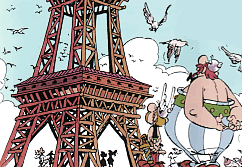
The short version of what happened at the Inuit studies conference:
-- Wednesday: train to Paris, reception at the Canadian embassy for the opening ceremony. Champagne, refined food, meeting interesting people.
-- Thursday: big long day, including reading my paper about orality, representation and films, which went far more smoothly than I expected. Meeting more interesting people, listening to more interesting papers. Dinner in a small restaurant with some of the interesting people we had met at the embassy.
-- Friday: nice day, extremely interesting papers, lunch with a friend we had met in York a year ago. Dinner cruise with everyone on the river Seine, and had a late night drink with a small party of interesting people.
-- Saturday: closing ceremony in the morning, Isuma's latest film The Journals of Knud Rasmussen in the afternoon. I loved it. Had dinner at the Lutetia brasserie on the quai Bourbon.
That's the short version.
-- Wednesday: train to Paris, reception at the Canadian embassy for the opening ceremony. Champagne, refined food, meeting interesting people.
-- Thursday: big long day, including reading my paper about orality, representation and films, which went far more smoothly than I expected. Meeting more interesting people, listening to more interesting papers. Dinner in a small restaurant with some of the interesting people we had met at the embassy.
-- Friday: nice day, extremely interesting papers, lunch with a friend we had met in York a year ago. Dinner cruise with everyone on the river Seine, and had a late night drink with a small party of interesting people.
-- Saturday: closing ceremony in the morning, Isuma's latest film The Journals of Knud Rasmussen in the afternoon. I loved it. Had dinner at the Lutetia brasserie on the quai Bourbon.
That's the short version.
October 24, 2006
Message à caractère informatif

Hier je n'ai même pas pensé à mon blog!
Et cette semaine je n'aurai pas le temps de toute façon, car Chloé et moi partons demain pour le congrès des études inuit à Paris. Donc c'est la panique habituelle, mais au moins j'aurai des choses intéressantes à raconter à mon retour: ça changera!
Bon je retourne préparer le couscous Garbit (très nordique, comme plat), et hop, au travail.
Et coucou Papa et Maman!
Et cette semaine je n'aurai pas le temps de toute façon, car Chloé et moi partons demain pour le congrès des études inuit à Paris. Donc c'est la panique habituelle, mais au moins j'aurai des choses intéressantes à raconter à mon retour: ça changera!
Bon je retourne préparer le couscous Garbit (très nordique, comme plat), et hop, au travail.
Et coucou Papa et Maman!
October 22, 2006
The abominable yet
Chloé and I are in the middle of a work session:
C "Listen to this: in my thesis I cited Foucault, and then I said 'yet, blah blah blah'. Can you believe I dared say yet about Foucault?"
D "You yetted Foucault?!"
C "I did. I yetted Foucault."
Lo and behold, the verbalized version of conjunction "yet" was born.
C "what's more, I used Thomas Wharton to yet Foucault and he doesn't even know it."
D "wait until he reads it from my blog. Now that I think of it, in my own thesis I yetted Sherrill Grace and the whole postcolonial theory."
C "well, that's something, too."
C "Listen to this: in my thesis I cited Foucault, and then I said 'yet, blah blah blah'. Can you believe I dared say yet about Foucault?"
D "You yetted Foucault?!"
C "I did. I yetted Foucault."
Lo and behold, the verbalized version of conjunction "yet" was born.
C "what's more, I used Thomas Wharton to yet Foucault and he doesn't even know it."
D "wait until he reads it from my blog. Now that I think of it, in my own thesis I yetted Sherrill Grace and the whole postcolonial theory."
C "well, that's something, too."
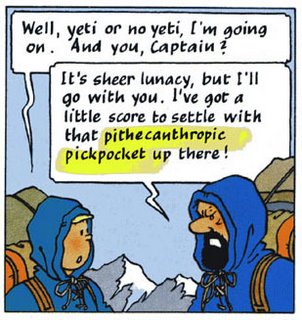
October 21, 2006
October 20, 2006
Food nut
I have just read somewhere that US Thanksgiving will be on November 23rd. So I have a month to figure out how to cook a pumkin pie. It shouldn't be too difficult. Corn on the cob is definitely easy, we had some for Canadian Thanksgiving. Everyone loved it! The brownies were delicious, too. The whole meal was great.
......I'm rambling about food again, aren't I?
......I'm rambling about food again, aren't I?

Le côté politique de la force...
 En général j'évite de me prononcer sur des sujets aussi complexes que l'Afrique du Nord et la France, parce que je n'ai jamais travaillé sur ces problèmes.
En général j'évite de me prononcer sur des sujets aussi complexes que l'Afrique du Nord et la France, parce que je n'ai jamais travaillé sur ces problèmes.Cela étant dit, je conseille la lecture de cet article. Il faut le prendre comme un parti pris, mais ça peut être un bon début de réflexion par rapport à Indigènes. Si quelqu'un trouve un autre son de cloche (à part celui, plus neutre, qui se contente de dire que le visa de Jamel a été refusé sans raison officielle), je suis preneuse, car je n'ai rien trouvé.
SI ce que suggère l'article d'Afrik.com est vrai, on aura de quoi s'énerver.
Sinon je reste sceptique sur l'approche de France 2 du problème, qui relègue la nouvelle du refus de visa dans la catégorie "potins de stars" de son blog:
-- soit ils décident de pousser le binarisme (méchants français/gentils algériens) au maximum, quitte à ne surtout pas se mouiller (une enquète qui remettrait en cause la crédibilité des autorités algériennes risquerait de gâcher l'impact du film, ce qui est un point de vue presque défendable),
-- soit la "peoplisation" de la politique et de l'histoire n'a officiellement plus aucune limite.
SI ce que suggère l'article d'Afrik.com est vrai, on aura de quoi s'énerver.
Sinon je reste sceptique sur l'approche de France 2 du problème, qui relègue la nouvelle du refus de visa dans la catégorie "potins de stars" de son blog:
-- soit ils décident de pousser le binarisme (méchants français/gentils algériens) au maximum, quitte à ne surtout pas se mouiller (une enquète qui remettrait en cause la crédibilité des autorités algériennes risquerait de gâcher l'impact du film, ce qui est un point de vue presque défendable),
-- soit la "peoplisation" de la politique et de l'histoire n'a officiellement plus aucune limite.
The lute connection
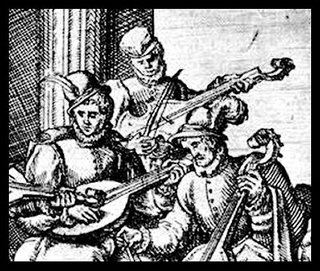
Obviously I'm not the only one who feels connected to the Elizabethan age (1575-2006). Sting (Songs from the Labyrinth) does too. Do I feel particularly connected to Sting, now? No. International stardom makes him even more remote than 16C lute players.
I do like the new album, though.
I do like the new album, though.
Beowulf is good for you
Beowulf I first heard of in 1st year, in "Introduction to English Literature". We were a group of maybe 200 or 150 students, at least half of which had no idea what they were doing there (anybody can get into college in France, they don't check on anything. Besides, it's very cheap).
When the teacher -- who is a great medievalist -- started with Beowulf, reading the part about his death in Old English, I heard rumblings of discontent rising. Someone said Old English is not English, so what was the point of all that? I had no friends in college at that time so I didn't exclaim how cool I thought it was, for fear of being hanged there and then by my fellow students. After the lecture, I did spot one student who seemed to think it was great, too. I think she was talking to the teacher, or something.
teacher -- who is a great medievalist -- started with Beowulf, reading the part about his death in Old English, I heard rumblings of discontent rising. Someone said Old English is not English, so what was the point of all that? I had no friends in college at that time so I didn't exclaim how cool I thought it was, for fear of being hanged there and then by my fellow students. After the lecture, I did spot one student who seemed to think it was great, too. I think she was talking to the teacher, or something.
The exact same thing happened with Thomas More and Utopia. Since it was first published in Latin, rumblings again, "what's the point" again... except I was the one spotted by that other student talking with the teacher after the lecture. Of course, the student was Chloé.
When the
 teacher -- who is a great medievalist -- started with Beowulf, reading the part about his death in Old English, I heard rumblings of discontent rising. Someone said Old English is not English, so what was the point of all that? I had no friends in college at that time so I didn't exclaim how cool I thought it was, for fear of being hanged there and then by my fellow students. After the lecture, I did spot one student who seemed to think it was great, too. I think she was talking to the teacher, or something.
teacher -- who is a great medievalist -- started with Beowulf, reading the part about his death in Old English, I heard rumblings of discontent rising. Someone said Old English is not English, so what was the point of all that? I had no friends in college at that time so I didn't exclaim how cool I thought it was, for fear of being hanged there and then by my fellow students. After the lecture, I did spot one student who seemed to think it was great, too. I think she was talking to the teacher, or something.The exact same thing happened with Thomas More and Utopia. Since it was first published in Latin, rumblings again, "what's the point" again... except I was the one spotted by that other student talking with the teacher after the lecture. Of course, the student was Chloé.
October 19, 2006
Light, air and water
I've just read this post: Environment r us and it made me want to post this:

(Delphine, Laquet sous le col de Lanserlia, devant la Dent Parrachée, Haute-Maurienne, 31 Aout 2006)
Doors and seeds
In Graham Greene's The Power and the Glory, the narrator says "there is always one moment in childhood when the door opens and lets the future in." The idea is that you're not the one who opens the door, it opens itself without your being aware. And you can only know in retrospect. What I would add is that not one door but many open throughout your lifetime.
The last major door I'm aware of opened in 2nd year, about five years ago. I say "door" but if its appearance depends on the impact it has on your life, then I should call it a portal. First semester of 2nd year we had a course about the British Empire. It was long and difficult because we had to learn about the simultaneous histories of Ireland, South-Africa, India and Canada (there was no Australian studies specialist at the time). That was my first glimpse into Canadian history.
During the same semester we had a literature class in which we studied Alice Munro's Lives of Girls and Women, and Kazuo Ishiguro's An Artist of the Floating World. We were all divided into groups for this class, and the teacher I ended with was Claire Omhovère -- the big Canadian studies specialist there (she wrote her thesis on Robert Kroetsch). She told us about art, about paintings, about words, about what it means to create, about the world you can see in just one work if you learn how to look. She planted so many questions, so many seeds in our little brains, that to this day I still feel the consequences of that class.
During the second semester, my friend Chloé and I received an email by that teacher, telling us she had invited a Canadian author for a reading, and he'd make an appearance in her 3rd year class before the reading, and would we be interested to come? We naive little students couldn't believe our luck. The teacher we admired so had remembered us, and we would get to meet a Canadian author. So of course we went to the 3rd year class, whose students didn't seem much impressed or enthusiastic. Or maybe that's just because we were insanely impressed and enthusiastic. Anyway that's how we "met" Thomas Wharton, whom I hope now we didn't scare. Thankfully we were way too shy to speak and talk nonsense. The reading was great too, he first talked about the process of writing Icefields, and then he read the first pages of Salamander. Both novels I read as soon as I could.
The last major door I'm aware of opened in 2nd year, about five years ago. I say "door" but if its appearance depends on the impact it has on your life, then I should call it a portal. First semester of 2nd year we had a course about the British Empire. It was long and difficult because we had to learn about the simultaneous histories of Ireland, South-Africa, India and Canada (there was no Australian studies specialist at the time). That was my first glimpse into Canadian history.
During the same semester we had a literature class in which we studied Alice Munro's Lives of Girls and Women, and Kazuo Ishiguro's An Artist of the Floating World. We were all divided into groups for this class, and the teacher I ended with was Claire Omhovère -- the big Canadian studies specialist there (she wrote her thesis on Robert Kroetsch). She told us about art, about paintings, about words, about what it means to create, about the world you can see in just one work if you learn how to look. She planted so many questions, so many seeds in our little brains, that to this day I still feel the consequences of that class.
During the second semester, my friend Chloé and I received an email by that teacher, telling us she had invited a Canadian author for a reading, and he'd make an appearance in her 3rd year class before the reading, and would we be interested to come? We naive little students couldn't believe our luck. The teacher we admired so had remembered us, and we would get to meet a Canadian author. So of course we went to the 3rd year class, whose students didn't seem much impressed or enthusiastic. Or maybe that's just because we were insanely impressed and enthusiastic. Anyway that's how we "met" Thomas Wharton, whom I hope now we didn't scare. Thankfully we were way too shy to speak and talk nonsense. The reading was great too, he first talked about the process of writing Icefields, and then he read the first pages of Salamander. Both novels I read as soon as I could.
A couple of weeks later Claire Omhovère invited us to a colloquium where PhD students presented papers on their research. All in Canadian studies, of course. It was a very small group, and I think I was the only student who had come to just listen (Chloé was in England). I had lunch with them, and yet again, I couldn't believe my luck. They were all grown-ups to me, and I had no clue why the teacher would want me there. It is very clear now that she was simply making sure some of those seeds she had planted in my brain would have a chance to burgeon.
So the door that opened in 2nd year led me to choose Mme Omhovère's 3rd year class without a second thought. The name of the class was "Inarticulate Arctic." It was about explorers in Canada, Franklin's expeditions, travel writing, clichés in Robert Service's poems, Wiebe's A Discovery of Strangers, appropriating voices, Canadian postmodernism, and so on.
And see now the plant of research is slowly growing in that brain of mine.
So the door that opened in 2nd year led me to choose Mme Omhovère's 3rd year class without a second thought. The name of the class was "Inarticulate Arctic." It was about explorers in Canada, Franklin's expeditions, travel writing, clichés in Robert Service's poems, Wiebe's A Discovery of Strangers, appropriating voices, Canadian postmodernism, and so on.
And see now the plant of research is slowly growing in that brain of mine.

October 18, 2006
Grog-gy
Highlight of my day so far:
Hot water, thyme (from my mother's garden), lemon, honey (from my grandmother's hives), green tea, and a twist of marsala (that I brought back from Italy in August). It tastes like heaven!
Hot water, thyme (from my mother's garden), lemon, honey (from my grandmother's hives), green tea, and a twist of marsala (that I brought back from Italy in August). It tastes like heaven!
October 17, 2006
All is well...
Yesterday night, 9 pm, as Chloé and I were having dinner:
D "oh"
C "oh what?"
D "oh, my throat is slightly sore on one side."
C "and that means...?"
D "that means I may come down with a pharyngitis or something"
C "oh that so wouldn't be the right time!"
D "well it would be typical of me: the week I have to work both on the "agreg" and on my research, I have to fall ill. I mean with all the work I have to do, it wouldn't be half as fun if I didn't end up stuck in bed, would it? Anyway I hope it's not going to happen."
C "you should take care of it right away"
Right now: I have a sore throat (all of it), I'm aching all over, and my head feels heavier than the rest of my body. Stuck in bed, I am. Chloé called and said "take care of it right away. If you don't it'll get worse and worse and I'll have to carry you to the conference next week. Sleep at least all day today and all day tomorrow." And I promised I would.
She will give me the third degree when she finds out I took the time to write this post.
I think my IQ is back to what it was in 1983:
D "oh"
C "oh what?"
D "oh, my throat is slightly sore on one side."
C "and that means...?"
D "that means I may come down with a pharyngitis or something"
C "oh that so wouldn't be the right time!"
D "well it would be typical of me: the week I have to work both on the "agreg" and on my research, I have to fall ill. I mean with all the work I have to do, it wouldn't be half as fun if I didn't end up stuck in bed, would it? Anyway I hope it's not going to happen."
C "you should take care of it right away"
Right now: I have a sore throat (all of it), I'm aching all over, and my head feels heavier than the rest of my body. Stuck in bed, I am. Chloé called and said "take care of it right away. If you don't it'll get worse and worse and I'll have to carry you to the conference next week. Sleep at least all day today and all day tomorrow." And I promised I would.
She will give me the third degree when she finds out I took the time to write this post.
I think my IQ is back to what it was in 1983:
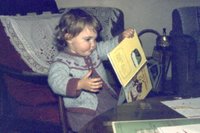
Subscribe to:
Comments (Atom)




